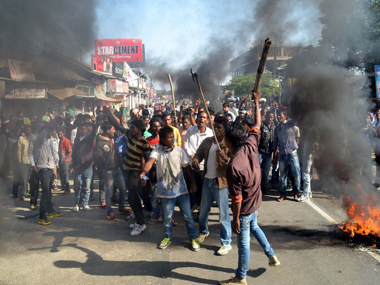New Delhi, Dec 27: Army Chief General Dalbir Singh Suhag will on Saturday visit violence-hit areas in Assam, a day after vowing to intensify operations against the NDFB(S) militants.
 Singh will first visit Guwahati and then Sonitpur and Kokrajhar where militants belonging to National Democratic Front of Bodoland (Songbijit faction) killed tribals on Tuesday. He would be briefed by officials there about the situation on the ground and the operation the Army has launched against the militants.
Singh will first visit Guwahati and then Sonitpur and Kokrajhar where militants belonging to National Democratic Front of Bodoland (Songbijit faction) killed tribals on Tuesday. He would be briefed by officials there about the situation on the ground and the operation the Army has launched against the militants.
The death toll in the attacks by NDFB(S), retaliatory violence by tribals and police firing stood has risen to 81.
The Army chief met Home Minister Rajnath Singh and later said: "We are definitely going to intensify our operations in Assam.”
The Home Minister, who returned to the national capital on Thursday evening after a two-day visit to Assam to take stock of the situation there arising out of the violence perpetrated by the Bodo militant group, discussed the situation in the state with Suhag.
"The meeting was to review the security situation in Assam," the Army Chief said.
Suhag said 66 Army columns (70 personnel in each column) have been deployed in Assam for counter insurgency operations.
The GoC of the 4 Corps, located in the worst-hit Sonitpur district, heads the Unified Command which conducts the counter insurgency operations in Assam.
Sources said the Home Minister asked the Army Chief to ensure that peace returns to the violence-hit areas and there is no flare up.
Singh told Suhag that Army presence should be increased on the field in Assam, Arunachal Pradesh and Meghalaya, where there is a presence of NDFB militants.
Sources said the Home Minister is believed to have discussed the issue of coordinated operations with armies of Bhutan and Myanmar against the NDFB which has bases in the two neighbouring countries.
External Affairs Minister Sushma Swaraj has already spoken to the Bhutan government which assured her of action against terror outfit. Myanmar has also given assurance to flush out terrorists from their territories.
Suhag told Singh that local Army commanders have been directed to ensure peace and bring confidence among common people, the sources said.
The Home Minister had on Thursday promised a "time-bound" action against the Bodo militant group which carried out the massacre of Adivasi tribals, ruling out talks with the insurgent outfit.
The death toll in the carnage and retaliatory violence by tribals rose to 78.






Comments
Add new comment